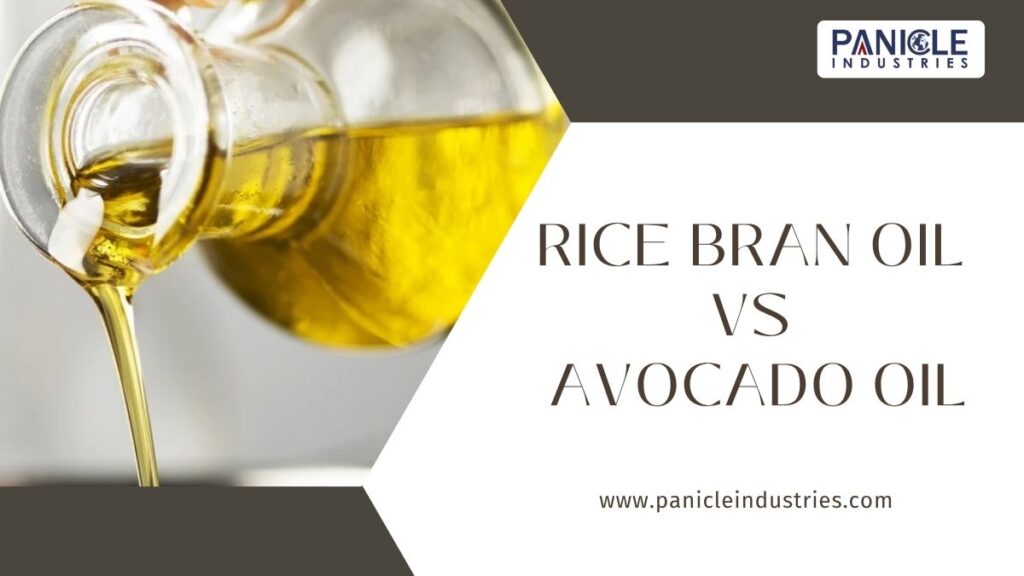Choosing the right cooking oil is important for your health and taste preferences. With so many oils available in the market, it can be difficult to decide which one is best. Two popular and healthy options are rice bran oil and avocado oil. Many people often compare these oils to understand their benefits, uses, and nutritional value.
In this blog, we will explore rice bran oil vs avocado oil in detail. We will talk about their sources, health benefits, smoke points, flavor, and best uses in cooking. Whether you are someone who cooks daily or just wants to choose a better oil for your family, this easy-to-understand guide will help you make the right decision. Let’s begin!
What Is Rice Bran Oil?
Rice bran oil is extracted from the outer layer of rice grains, known as the bran. This oil is widely used in Asian countries and is becoming more popular worldwide. It has a light texture and a mild flavor, making it a great choice for various cooking methods like frying, sautéing, and baking. Rice bran oil is known for its high smoke point, meaning it can handle high temperatures without burning or losing its nutritional value.
What Is Avocado Oil?
Avocado oil is made by pressing the pulp of avocados. This oil is rich in monounsaturated fats and is highly nutritious. It has a buttery flavor and is often used in dressings, cooking, and even skincare. Avocado oil is known for its excellent health benefits, including heart health, antioxidant properties, and skin care. Like rice bran oil, it also has a high smoke point, making it suitable for cooking at high heat.
Also read: What Rice Bran Oil Does Chipotle Use
Nutritional Comparison: Rice Bran Oil vs Avocado Oil
Here is a simple table to compare the basic nutrition values (per tablespoon):
| Nutrient | Rice Bran Oil | Avocado Oil |
|---|---|---|
| Calories | ~120 kcal | ~120 kcal |
| Total Fat | ~14g | ~14g |
| Saturated Fat | ~2.7g | ~1.6g |
| Monounsaturated Fat | ~5g | ~10g |
| Polyunsaturated Fat | ~5g | ~2g |
| Vitamin E | Present | Present |
| Antioxidants | Gamma-oryzanol | Lutein, Vitamin E |
As seen above, both oils are calorie-dense but healthy when used in moderation. Avocado oil is richer in monounsaturated fats, while rice bran oil contains more polyunsaturated fats and a special antioxidant called gamma-oryzanol.
Health Benefits of Rice Bran Oil
Rice bran oil offers many health benefits:
- Heart Health: It helps reduce bad cholesterol (LDL) due to compounds like oryzanol.
- Antioxidants: Contains Vitamin E and gamma-oryzanol which fight free radicals.
- Weight Management: Light in texture, it does not feel greasy and is suitable for low-fat diets.
- Skin and Hair Benefits: Used in skincare for its anti-aging properties.
- Diabetes Management: May help control blood sugar when used as part of a balanced diet.
Health Benefits of Avocado Oil
Avocado oil is also packed with health benefits:
- Heart Health: High in monounsaturated fats which are good for the heart.
- Eye Health: Contains lutein, a natural antioxidant that supports eye health.
- Nutrient Absorption: Helps the body absorb fat-soluble vitamins like A, D, E, and K.
- Anti-Inflammatory: Contains compounds that reduce inflammation in the body.
- Skin Nourishment: Great for moisturizing skin and healing dry or damaged areas.
Smoke Point: Which Oil Handles Heat Better?
Smoke point is the temperature at which oil starts to burn and produce smoke. Cooking above the smoke point can destroy nutrients and create harmful compounds.
- Rice Bran Oil: Around 232°C (450°F)
- Avocado Oil: Around 271°C (520°F)
Both oils are excellent for high-heat cooking, but avocado oil has a slightly higher smoke point, making it more stable for deep frying and grilling.
Flavor and Cooking Use: Which Oil Suits Your Kitchen?
- Rice Bran Oil: Mild, neutral flavor. It does not interfere with the taste of your food. Ideal for Indian, Chinese, and everyday dishes.
- Avocado Oil: Has a slightly nutty, buttery taste. Best for Western dishes, salad dressings, or recipes where the oil’s taste is part of the flavor profile.
If you cook spicy or bold-flavored dishes, rice bran oil is a better match. If you enjoy healthy salads, pasta, or grilled veggies, avocado oil adds extra flavor.
Cost and Availability
- Rice Bran Oil: Generally more affordable and easily available in India and Asian countries.
- Avocado Oil: Usually more expensive and may be harder to find in some local markets. More common in health stores and imported food sections.
If you are on a budget, rice bran oil offers great value with health benefits. If price is not a concern and you want a richer oil, avocado oil is worth trying.
Which Oil Is Better for Weight Loss?
Both oils can support weight management if used in the right amount. Avocado oil has more monounsaturated fats, which are known to help reduce belly fat. Rice bran oil, on the other hand, has a lighter texture and is absorbed less by food during cooking, making it suitable for low-fat meals.
So, both are good, but portion control is the key to weight loss.
Rice Bran Oil vs Avocado Oil: Quick Summary Table
| Feature | Rice Bran Oil | Avocado Oil |
|---|---|---|
| Source | Rice bran (outer layer) | Avocado fruit |
| Flavor | Neutral | Buttery, nutty |
| Smoke Point | 450°F (232°C) | 520°F (271°C) |
| Best Use | Stir-frying, deep frying | Salads, sautéing, grilling |
| Price | Affordable | Expensive |
| Health Benefits | Heart, cholesterol | Heart, eyes, skin |
| Antioxidants | Oryzanol, Vitamin E | Lutein, Vitamin E |
| Fat Type | Poly & Mono fats | Monounsaturated fats |
| Availability | Widely available in Asia | More in Western markets |
Which Oil Should You Choose?
If you are cooking Indian dishes daily and want a healthy, budget-friendly oil, rice bran oil is a smart choice. It’s neutral, heat-stable, and heart-healthy.
If you prefer western-style recipes, want more healthy fats, and don’t mind spending a bit more, avocado oil offers better taste and extra health perks.
The best approach? Keep both oils in your kitchen and use them based on the recipe. That way, you enjoy the benefits of both without compromising on health or flavor.
Conclusion
When comparing rice bran oil vs avocado oil, both have unique benefits and uses in the kitchen. Rice bran oil is light, neutral, and excellent for high-heat Indian cooking. Avocado oil offers more flavor, higher monounsaturated fats, and great nutrition for Western recipes and dressings. Choosing between them depends on your cooking style, taste preference, and budget. You can even use both oils in different dishes to enjoy the goodness of each. In the end, what matters most is balance and moderation. Pick the oil that fits your health needs and lifestyle best. With the right choice, every meal becomes healthier and tastier.


